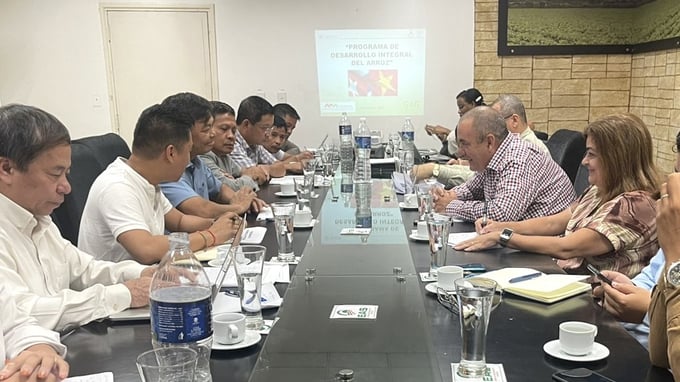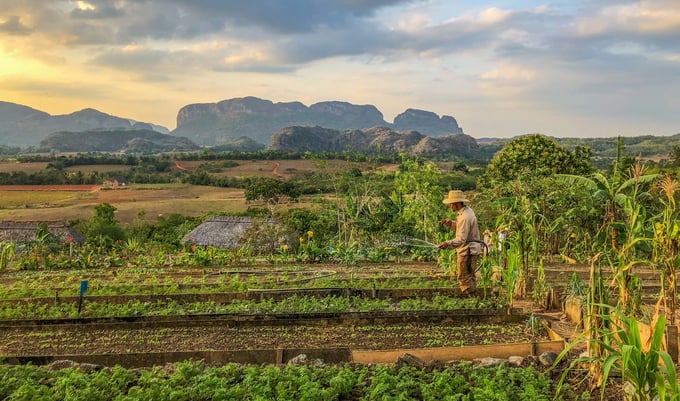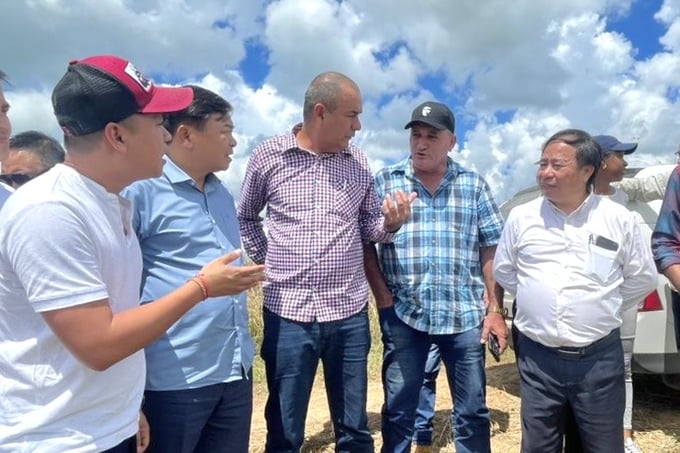May 24, 2025 | 10:41 GMT +7
May 24, 2025 | 10:41 GMT +7
Hotline: 0913.378.918
May 24, 2025 | 10:41 GMT +7
Hotline: 0913.378.918

Meeting between the Ministry of Agriculture and Rural Development and the Cuban Ministry of Agriculture in Havana. Photo: ICD.
On September 22 in Havana, Cuba, Deputy Minister of Agriculture and Rural Development, Nguyen Hoang Hiep, met with Cuba's Minister of Agriculture, Ydael Perez Brito.
At the beginning of the meeting, Deputy Minister Nguyen Hoang Hiep conveyed the greetings and well wishes from Vietnam’s Minister of Agriculture and Rural Development, Le Minh Hoan, to the Cuban Ministry’s delegation.
Cuba, with a population of over 11 million, consumes approximately 700,000 tons of rice per year. However, from 2009 to 2022, the country’s rice cultivation area averaged only 135,000 hectares annually, producing around 290,000 tons of rice. This output meets less than 50% of the domestic rice demand.
Over the years, the Vietnamese government has implemented numerous cooperation programs, aid initiatives, and food trade agreements to support Cuba in achieving self-sufficiency and ensuring food security. The Ministry of Agriculture and Rural Development was tasked with implementing a rice development cooperation project in Cuba, which is now in its fifth phase. The focus of investment was during phase four (2010-2015), and phase five is currently underway.
Thanks to this cooperation, the pilot rice production model in Cuba has achieved impressive yields of up to 7–8 tons per hectare. Cuban agriculture has also significantly improved its irrigation infrastructure, allowing for more proactive management of water resources to expand rice cultivation to two crops per year. Additionally, support in machinery, production equipment, rice varieties, and enhanced training and agricultural extension programs has yielded clear and positive results.

Cuba has advantages in fertile land resources and developed irrigation systems.
Minister Ydael Pérez Brito expressed gratitude to Vietnam for its ongoing support in boosting Cuba's agricultural development and ensuring food supplies for the Cuban people. However, the Minister noted that Cuba continues to face challenges, particularly in the lack of materials and spare parts for machinery, which has kept the average rice yield relatively low.
In response, Deputy Minister Nguyen Hoang Hiep emphasized that it is time to shift towards a more sustainable model of cooperation, aimed at helping Cuba reduce its reliance on imports and external aid.
"The reality shows that, with its favorable natural conditions and fertile land, Cuba has great potential to produce food domestically. To enhance production capacity, we propose that you restructure your production organization and expand the supply services for essential materials such as seeds, fertilizers, and fuel. This will require active participation from businesses throughout the rice production chain," Deputy Minister Hiep remarked.

Cuban Minister of Agriculture Ydael Pérez Brito (third from right) and Deputy Minister Nguyen Hoang Hiep (second from left) visit rice fields in Cuba. Photo: ICD.
The governments of both countries are actively promoting the participation of Vietnamese enterprises in Cuba's rice production chain. This cooperation plan aims to help Cuba swiftly increase its local food supply, lower import costs, and improve the quality of rice. Organizing production based on an enterprise model not only boosts productivity but also enhances workers' income, while encouraging the sustainable development of Cuban businesses.
Translated by Quynh Chi

(VAN) In the tranquil wetlands of Van Long, there are quiet souls who guard the forests, nurture the waters, and oversee every bird and troop of langurs as protecting the essence of a living heritage.

(VAN) WWF, GIZ, IUCN, UNDP call for biodiversity conservation and sustainable development must be regarded as a unity in strategies for a green future.

(VAN) On celebration of International Day for Biological Diversity, Deputy Minister Nguyen Quoc Tri called for practical actions to address nature and biodiversity conservation.

(VAN) Dr. Hoang Thi Thanh Nhan – Deputy Director of the Nature and Biodiversity Conservation Agency – highlighted this on the International Day for Biological Diversity, May 22, 2025.
![Ho Chi Minh city adapts to climate change: [2] Accelerating action](https://t.ex-cdn.com/nongnghiepmoitruong.vn/608w/files/chiqk/2025/05/22/4024-4220-bien-doi-khi-hau-1-100626_766.jpg)
(VAN) Clearly recognizing the challenges posed by climate change, Ho Chi Minh city has swiftly shaped its policies and implemented practical solutions to adapt.

(VAN) Rice straw is no longer just a discarded byproduct, but it is becoming a green resource that helps farmers in the Mekong Delta reduce emissions and promote circular, sustainable agriculture.

(VAN) Other Effective Area-based Conservation Measures (OECMs) are solutions that contribute effectively to achieving the goals of the Kunming–Montreal Global Biodiversity Framework.